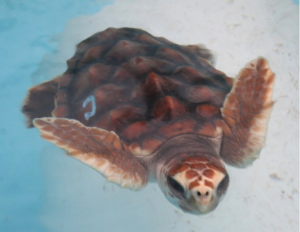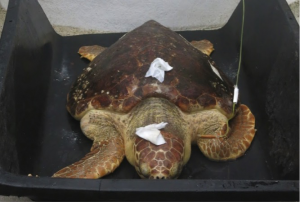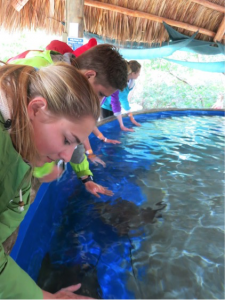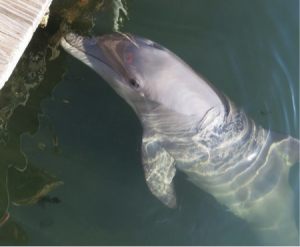Today we had a “field trip” day and ventured out from DRC to visit The Turtle Hospital and Aquarium Encounters!

At the Turtle Hospital, we learned about species, behaviors, threats, and veterinary care for different sea turtles. The hospital’s motto is “Rescue, Rehab, Release,” and they’ve done just that for well over 1500 turtles of several species. Turtles are relatively easily rehabilitated because they do not rely on parental learning or highly learned, flexible behaviors like hunting; however the animals are very susceptible to injuries which can include boat strikes, entanglement in garbage, digestive impaction from attempting to consume garbage, and others and can have results ranging from paralysis to imbalanced and uncontrollable buoyancy, both of which can be a death sentence without care lasting from a few months to a few years.
While humans are the cause of many patients injuries, some come in with natural injuries, and many neonates come in when they don’t leave the nest. Scientists dig up nests after counting to get a census of how many were born, and they often find hatchlings that don’t seem make it out of the nest. Since the species are mostly threatened, these animals are often sent to the hospital to help increase wild population size. Originally, the hospital was largely supported by running a joined hotel (which was the original property), but after hurricane damage it was not repaired or reopened. They operate a fleet of turtle ambulances for rescues and transits. Release is, however, extremely successful. When turtles are deemed non-releasable, it is most often because their injuries are too disabling to thrive in the wild. These animals become permanent residents of the hospital, often with decades or even centuries to make friends and help heal new patients. We learned that once healthy, the turtles can literally help save lives! The healthy residents can donate blood to save incoming patients with severe trauma and blood loss.

Next, we made our way to Aquarium Encounters, a commercial attraction featuring fish, rays, sharks, turtles, tortoises, and more! We got a better look at some animals we had seen briefly in the wild, and met some we hadn’t yet encountered. A lot of us spoke later and were put off from the facility a bit, after living and learning DRC’s clear prioritization of welfare, animal enrichment, research, education, and only finally entertainment; we were more aware that Aquarium Encounters was mostly an entertainment vacation attraction. They explained that they contract with a company to wild capture the animals they want to exhibit, then often simply release them after they outgrow the aquarium.
By contrast, no dolphins have been captured from the wild for any facility in the United States since the late 1980’s. While we did engage in touch tanks and ray feedings, we noted the difference in the tanks, which were almost completely accessible to the public, whereas at DRC the animals only interact with people when they seek to and can easily retreat from any undesired interaction. We didn’t discuss life expectancy, mortality, husbandry, or veterinary care in the depth we have at DRC, but whereas DRC dolphins can expect to live twice as long as their wild counterparts, we did not get the same impression from Aquarium Encounters.

When we finally returned to DRC, it felt like we had been away for ages! We had a short coral reef seminar, where we learned about how delicate reefs have been devastated by human impacts in the last 50 years. This seminar helped us appreciate our recent snorkel trip to Looe Key, identify, and know the ecology of the species we spotted. Next, we visited our dolphin friends in an evening observation session. It was Gypsy’s birthday today so we wished her well and headed home for the evening!

Written by Kat Titterton and Zach Papadopoulos

